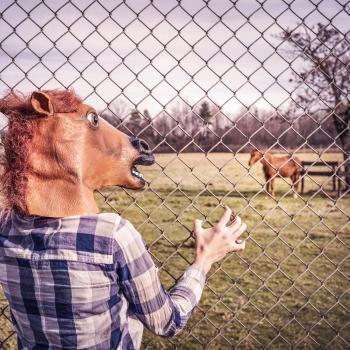We are doing a scripture study together: reading along through some scriptures and discussing the passages. This is the third post on The Bhagavad Gita.
From the Winthrop Sargeant translation of The Gita…
8. Your Lordship and Bhishma and Karna
And Kripa, always victorious in battle,
Ashvatthaamaan and Vikarna
And the son of Somadatta also;
9. And many other heroes
Whole lives are risked for my sake,
Attacking with various weapons,
All skilled in battle.
10. Insufficient is that force of ours
By Bhishma guarded;
Sufficient though, this of these,
The force by Bhima guarded.
11. And on all movements,
Stationed each in his respective place,
Protect ye Bhishma,
All of you, indeed!
So this is the list of people on the Kaurava side, as predicted last week! In week one we went over a number of people who are part of the Mahabharata’s story and now there are some new names…
Bhishma is another very important character. He is on the “bad guy” side because of fate, though he believes in the Pandava cause. His life could be said to have started the entire crisis of succession.
Bhishma was the prince in line to inherit this kingdom many, many years prior to the battle. His story goes back to his father, King Shantanu who fell in love with Ganga, the goddess of the river. Of course, he didn’t know she was Ganga.
She came to earth in order to give birth to eight “Vasus” who are elemental minor Gods. They were caught stealing a cow from a sage named Vashishta and cursed to be born human. Seven of them were allowed to have only a brief time on earth, but the one who spear-headed the cow stealing had to live longer.
So Ganga agreed to be their mother. She marries King Shantanu but tells him that he must never question anything she does. Ever. He thinks she’s wonderful, so he’s not afraid to agree. But each time they have a child, Ganga takes it to the river and drowns it.
Shantanu is horrified, but he loves her so he says nothing. But at the eighth child he can stand it no longer and he confronts Ganga. That eighth child was the one Vasu cursed to have a long life. Ganga leaves Shantanu because he broke his promise not to question her. Ganga raises Bhishma in the realm of the Gods where he is taught everything he would need to be a good and righteous king and then is returned to Shantanu.
So now Shantanu is alone with just his son. One day he falls in love with a fisherman’s daughter named Satyavati. But she and her family refuse to wed Shantanu because her children would never rule.
Bhishma then makes the greatest sacrifice. He swears eternal celibacy so he cannot become King and Satyavati’s children will be in line for the throne instead. Because Bhishma shows so much dedication to his father’s happiness that the Gods reward him with the boon to be able to choose the time of his own death.
It is from Satyavati’s line that Pandu and Dhiritarashtra are born.
Bhishma becomes an important adviser in the palace and a witness to all that goes on through the generations. When this war comes up, Bhishma would like to be on the side of the Pandavas, but he is attached to the throne and trapped on the side of those already in place, the Kauravas.
Despite his reluctance, he gives all he has to the war. Taking down a man who can choose the time of his own death is an enormous challenge for the Pandavas. But that’s a story for another time!
That’s a long story, but it is necessary to understand what a large roll Bhishma has.
Karna I mentioned Karna in passing in week one. He is the first born child of Kunti, the mother of the Pandava. Like them, his father is a God (Surya, God of the sun). But Kunti abandoned Karna as a baby, sending him down a river in a basket because she is afraid of what she has done.
Karna shows up one day to challenge Arjuna in archery. The Pandava side laughs him out of the tournament because he has no lineage to show and cannot prove that he has the credentials to compete. He was raised by a chariot driver, which is a much lower class than the warrior caste.
However, Duryodhana welcomes Karna and gives him a small city to rule so that he is qualified. His friendship buys a lot of loyalty from Karna. Even later when Karna learns the truth about his birth, that he is actually the elder brother of the Pandavas, he chooses to stay on the losing side of the war.
Karna and Arjuna have an ongoing rivalry and they both know that one day fate will put them across from each other in battle and only one will survive.
Kripa is Drona’s brother-in-law (Drona’s wife’s brother).
Ashvatthaamaan is Drona’s beloved son. There is a story that goes with him too, but we’ll save that for another day.
Vikarna is another of the sons of Dhritarastra. So he is brother to Duryodhana (there are 100 brothers all together).
The Son of Somadatta is given as a warrior prince on the Kaurava side without further detail. In Internet commentary he is said to be Bhurishravas and a cousin of Bhishma.
***
Okay, now that we’re past the introductions!
In Verse 8 “Your Lordship” refers to Drona, to whom Duryodhana is still speaking.
Verse 10 is very strange here. Duryodhana says that his force, led by Bhishma is not sufficient while the other force led by Bhima is. (I think it’s nice poetically that the text balanced Bhishma against Bhima).
The Sanskrit word given is aparyaptam, which means: incomplete, insufficient, unlimited, unbounded, unequal. My mother says she has also seen it translated as “insurmountable”
To me it seems like the verse works if you use one of those later translations. If Duryodhana says his force is unequal or unlimited or insurmountable” then he’s saying he’s powerful, right?
Well, apparently there is a reason that translation doesn’t work because Sargeant has a long footnote discussing this “controversy.”
He says this verse has puzzled translators for years because Duryodhana’s forces are larger than the Pandava’s, Bhishma is a much more skilled and experienced leader, and Duryodhana tends to be very confident so it seems unlike him.
An explanation was published by J.A.B. van Buitenen in 1965 saying that there was an earlier version of the Gita in the ninth century and in that text the names Bhishma and Bhima are reversed. Which does seem an easy error to make when copying. So then the verse would read…
That army guarded by Bhima is not equal to us;
On the other hand, this army, guarded by Bhishma is equal to them.
Sargeant then points out that Bhima is not actually the leader of the Pandavas at all. He says that Edgerton thinks the name Bhima was chosen to make a word play with the two names (the exact thought I had when I read it).
Verse 11 speaks to how critical Bhishma is to the Kaurava strategy. He cannot die, but perhaps he could still be wounded. That would explain Duryodhana’s instruction to protect Bhishma.












